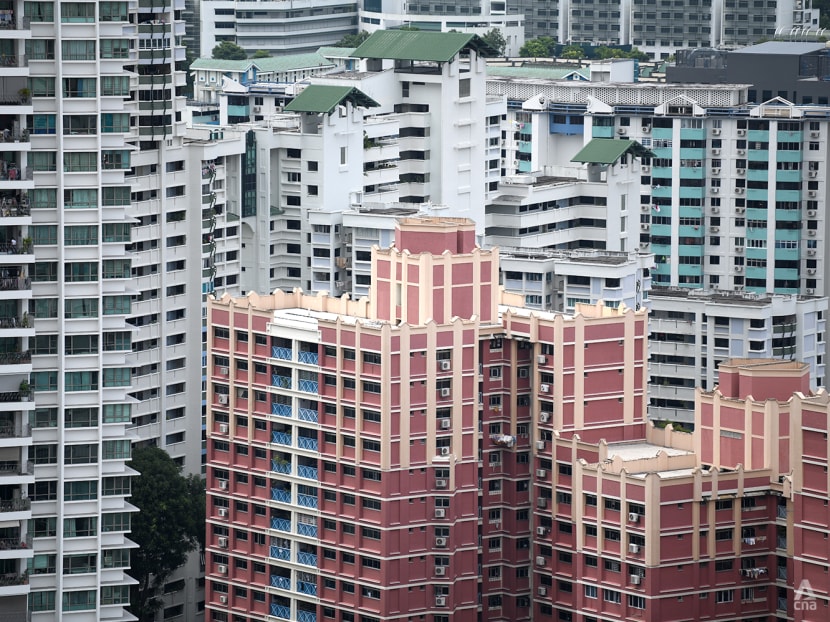Home recovery scheme to become default care arrangement for everyone, other than a few groups: MOH

- From Oct 10, home recovery will be the default care arrangement model for COVID-19 patients, except for:
- Partially or unvaccinated people aged 50 and above
- Vaccinated people 80 years and older
- Children under 1, and children aged 1 to 4 years who have been assessed to be clinically unsuitable for home recovery
SINGAPORE: From Sunday (Oct 10), the home recovery scheme will be expanded to become the default care arrangement for everyone, with the exception of a few groups, the Ministry of Health (MOH) announced on Saturday.
COVID-19 patients who are not eligible for the scheme include partially or unvaccinated people who are aged 50 years and above, as well as vaccinated seniors aged 80 years and above.
Children below the age of one, and children between the age of one and four who have been assessed to be clinically unsuitable for home recovery, will also not be eligible for the scheme, said MOH.
Currently, only those who are fully vaccinated, aged between 12 and 69 years old, and have no severe co-morbidities or illnesses are eligible for home recovery.
They must also be able to self-isolate in a room, "preferably" with an attached bathroom, said MOH.
There must also be no household members who are more than 80 years old or are in one of the vulnerable groups, such as pregnant women or those with weakened immune response or multiple co-morbidities, added MOH.
With the changes, those who are unvaccinated, and aged between 12 and 49 years will be able to recover at home.
This is because the severity of illness for such younger and unvaccinated individuals is low, said MOH.
In addition, fully vaccinated COVID-19 patients aged between 70 and 79 years will be able to recover at home from Oct 16, said MOH.
“Given the clinical observations to-date of vaccinated infected persons aged 70 to 79 years, and the fall risks associated with such elderly persons in an unfamiliar environment, it will also be safer for them to recover in the familiar surroundings of their home,” said MOH.
However, as a precaution, individuals from both groups, will be assigned to a healthcare provider and should monitor their health closely, including their oxygen level, during the isolation period, said MOH.
MOH added that they should also consult the healthcare provider early should there be any significant deterioration in their health.
The default home recovery will also be extended to children aged between five and 11 years, as MOH has found that COVID-19 is not a serious illness for the vast majority of them.
“Furthermore, parents have often requested that children be allowed to recover at home, where there are caregivers from the family,” said MOH.
As for those aged between one and four, MOH said it will extend the home recovery to them provided that they are first clinically assessed at the hospitals to be suitable for home recovery.
Patients under the home recovery programme will continue to have 24/7 access to medical support, said MOH.
“This may be available through existing telemedicine providers as well as a strengthened network of medical support with the Public Health Preparedness Clinics (PHPCs) or polyclinics who have come on board the programme to help provide continuity of care for their patients,” said MOH.
For non-medical assistance, individuals can reach out to the Home Recovery Buddy Hotline at 6874 4939, it added.
Since the start of the home recovery programme, more than 19,000 patients have been recovering at home, of which more than 8,000 have fully recovered and been discharged.
Speaking at a COVID-19 multi-ministry task force press conference on Saturday, Health Minister Ong Ye Kung said the country continues to make progress on the home recovery programme.
“We have beefed up the team further, today - other than the minority whose contact numbers are inaccurate - we are able to call all infected persons and onboard them within the day,” he said. “As for incoming calls, we can now attend to the great majority of callers. The telemedicine team has also been bolstered, so that they can attend to those who need medical attention."
'We wish we can be given more time to improve the processes that stabilise operations, but as we expect cases to rise further, we will need to press on, extend the programme even as we make improvements,” he added.
NEW COMMUNITY ISOLATION FACILITIES
Mr Ong said community care facilities and some government quarantine facilities will be gradually converted into community isolation facilities (CIFs).
These will be part of the home recovery programme operations, he said, adding that the move is a “necessary and sensible” one.
“The CIFs will allow those who are either not able to isolate themselves at home, or who may have vulnerable persons at home, to undergo recovery safely isolated in a separate premise from home,” he said.
“As more travellers perform their stay-home notice home, we could also potentially convert some SHN facilities to CIFs as well,” he added.
TIMED DISCHARGE FROM HOME RECOVERY
MOH said COVID-19 patients under the home recovery programme will be discharged based on the time since diagnosis, without the need for further tests.
This is because evidence has shown that viral loads in infected persons will decline and reach undetectable or non-infectious levels with time, said MOH.
It added that this happens in vaccinated persons and young children, even if unvaccinated, earlier than in those who are unvaccinated.
For those who are vaccinated and children aged 12 years and below, the home recovery isolation period will last for 10 days.
As for those who are not vaccinated and above the age of 12 years, their isolation period will last for 14 days, said MOH.
“Thereafter, they will be provided with an electronic discharge memo upon the end of their isolation period. For simplicity, we will remove the Day 7 discharge for (a) vaccinated person based on a PCR test that is negative or of low viral load,” said MOH.
|
Age |
5-11 years old (and 1-4 if eligible) | 12-79 years old | 12-49 years old |
|---|---|---|---|
|
Vaccination status |
Not applicable | Fully vaccinated | Partially vaccinated/Unvaccinated |
| Health conditions |
|
|
|
| Isolation requirement | 10 days isolation | 10 days isolation | 14 days isolation |
| After discharge | Minimise social activities for 7 days | Minimise social activities for 7 days | Minimise social activities for 7 days |
Related:
BOOKMARK THIS: Our comprehensive coverage of the COVID-19 pandemic and its developments
Download our app or subscribe to our Telegram channel for the latest updates on the coronavirus pandemic: https://cna.asia/telegram













